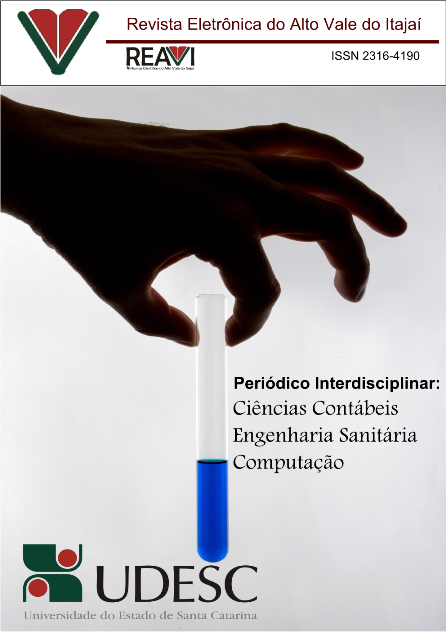Auxiliando a alfabetização com objetos de aprendizagem
DOI:
https://doi.org/10.5965/2764747102032013055Palavras-chave:
objetos de aprendizagem, alfabetização, jogos educacionaisResumo
Este trabalho faz um relato sobre os problemas da alfabetização e as possibilidades de utilização da informática como forma de amenizar esses problemas. Com base nesses fundamentos, foram desenvolvidos dois objetos de aprendizagem para auxiliar no processo de alfabetização. Um dos objetos utiliza a técnica de reconhecimento e ordenação de letras. O outro objeto aplica a formação de palavras com a ordenação das sílabas. Ambos os objetos são apresentados nesse artigo. Ao final do trabalho são descritas as experiências na aplicação desses objetos em turmas do segundo ano do Ensino Fundamental, em dois semestres distintos.Downloads
Referências
BASTOS, Elisabeth Soares; SILVA, Carmen Granja; SEIDEL, Suzana; FIORENTINI, Leda Maria Rangearo. Introdução à Educação Digital. Caderno de estudo e prática. Ministério da Educação, Secretaria de Educação à Distância. Brasília, 2008.
BITTENCOURT, Glaucimar Rodrigues; FERREIRA, Mariana Denise Moura. A importância do lúdico na alfabetização. Trabalho de Conclusão de Curso (Licenciatura em Pedagogia) - Centro de Ciências Humanas e Educação, Universidade da Amazônia, Belém, 2002.
CAGLIARI, Luiz Carlos. Alfabetização & Lingüística. São Paulo: Scipione, 2003.
FERREIRO, Emília. Com todas as letras. São Paulo: 5 ed. Cortez, 1996.
GARCIA, Fabiane Maia. Tecnologia e educação: relações históricas, locais e mundializadas. In: RENOTE - Revista Novas Tecnologias na Educação, v. 3, n. 1, 2005.
GRÜBEL, Joceline Mausolff; BEZ, Marta Rosecler. Jogos Educativos. Instituto de Ciências Exatas e Tecnológicas- Centro Universitário Feevale, Rio Grande do Sul, 2006.
IEEEP1484.12, IEEE Learning Technology Standards Committee (LTSC), 2000. Disponível em: http://www.ieeeltsc.org:8080/Plone. Acessado em 18/09/2012.
KONRATH, Mary Lúcia Pedroso; CARNEIRO, Mara Lucia Fernandes; TAROUCO, Liane Margarida R. Estratégias pedagógicas, planejamento e construção de Objetos de Aprendizagem para uso pedagógico. In: RENOTE - Revista Novas Tecnologias na Educação, v. 7, n. 1, 2009.
MATHIAS, Carmen Vieira; VASCONCELOS, Janilse Fernandes Nunes; FAGAN, Solange Binotto. Objetos de Aprendizagem na Educação Infantil. In: RENOTE - Revista Novas Tecnologias na Educação, v. 7, n. 1, 2009.
PEDRÓ, Francesc; A necessidade de uma abordagem Sistêmica. Inspirados pela Tecnologia, norteados pela pedagogia. Uma abordagem Sistêmica das inovações educacionais de base tecnológica. Organização para Cooperação e o Desenvolvimento Econômicos - OCDE. Centro de Pesquisas Educacionais e Inovação. Santa Catarina, 2010.
PEREIRA, Lisandra Locatelli; CORDENONSI, André Zanki. Softwares Educativos: Uma Proposta de Recurso Pedagógico para o Trabalho de Reforço das Habilidades de Leitura e Escrita com Alunos dos Anos Iniciais. In: RENOTE - Revista Novas Tecnologias na Educação, v. 7, n. 3, 2009.
SANTA CATARINA, Secretaria do Estado da Educação, Ciência e Tecnologia. Proposta Curricular de Santa Catarina: estudos temáticos. Florianópolis: IOESC, 2005.
SAVI, Rafael; ULBRICHT, Vânia Ribas. Jogos Digitais Educacionais: Benefícios e Desafios. UFSC, Programa de pós-graduação em Engenharia e Gestão do Conhecimento, 2008.
SOARES, Magda. Letramento: um tema em três gêneros. São Paulo: Ed. 3 Belo Horizonte, Autêntica, 2009.
TEBEROSKY, Ana; COLOMER, Teresa. Aprender a ler e escrever: uma proposta construtivista. Ed.Artmed, Porto Alegre, 2003.
VYGOTSKY, Semiónovich Live. Obras escogidas. Edicion em lengua castelhana dirigida por Amélia Alvarez y Pablo Del Rio. Traduccion. José Maria Bravo. Editorial Pedagógica, Moscú, Madrid, España: Gráficas Rógar, Fuenlabrada, 1982.
WEISZ, Telma. Como se aprende a ler e escrever ou prontidão, um problema mal colocado. Ciclo Básico, Cenp, São Paulo, 1988.
Downloads
Publicado
Como Citar
Edição
Seção
Licença
Copyright (c) 2013 Cristiane dos Santos, Adilson Vahldick, Eliana Jaeger

Este trabalho está licenciado sob uma licença Creative Commons Attribution 4.0 International License.














